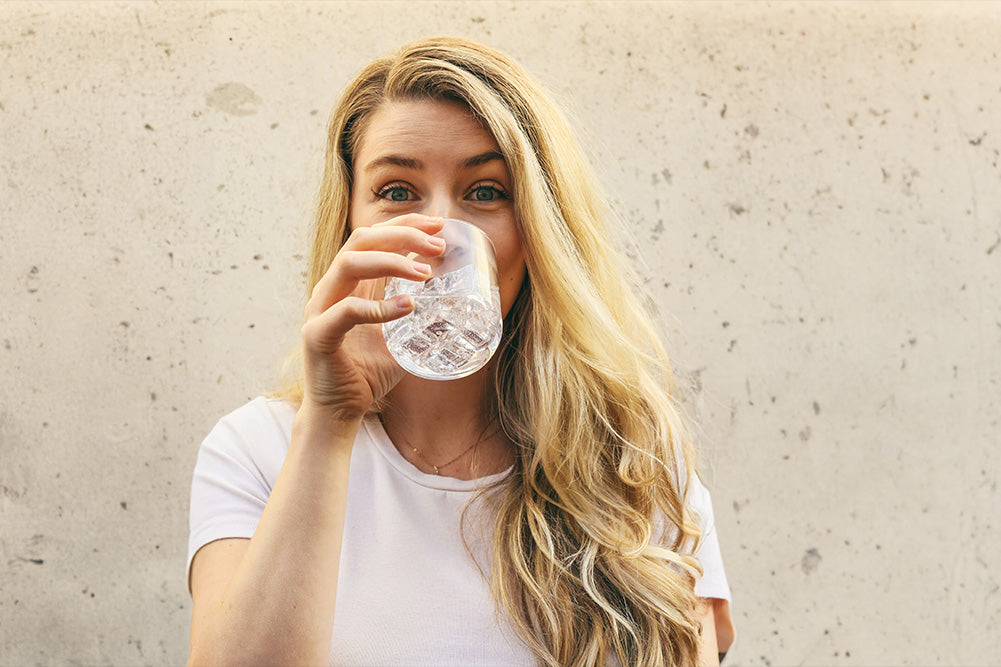Your Cart is Empty
May 30, 2024 4 min read

It is no question that proper hydration is something you should strive for. Drinking adequate water daily can boost your metabolism and keep your organs functioning properly, all without consuming any extra calories. So the question remains: How much water is “adequate” for proper hydration?
Water is the single-most important factor in human survival. While humans can last weeks without food and nutrients, it is unlikely they would survive longer than three days without water. This is because “every cell, tissue and organ in your body needs water to work properly” (1). Water regulates body temperature, lubricates joints, and rids the body of waste through urination. Water can also improve digestion, rejuvenate dry skin, and promote healthy bladder function(2).
Drinking water will also lower your risk of dehydration, which happens when your body does not have enough water to function properly. In mild cases, dehydration can cause dry skin/mouth, headaches, fatigue, and constipation. In more extreme cases, it can lead to fainting spells, low blood pressure, and heat intolerance (3). Drinking enough water is crucial to ward off symptoms of dehydration.
While most people want an exact number of ounces to drink a day, there are more factors at play than that. The classic “eight ounces a day” is a good ballpark, but studies assert that there is not one quantitative amount to prescribe to everyone. The University of Missouri finds that body weight plays a role in how much water you should be drinking a day. They encourage you to “take half your body weight, and drink that amount in ounces of water” (4). For example, someone weighing two hundred pounds should drink one hundred ounces of water a day, or a little over twelve cups of water.
That being said, most people find a qualitative approach easier to follow when it comes to drinking water. As a general rule, drink water when you are thirsty. If you exercise or sweat, then up your water intake. Drinking water before, during, and after a workout can help decrease the risk of dehydration (1). Women pregnant or breastfeeding require one to three extra cups of water a day than the average woman, and anyone experiencing illness that results in vomiting, diarrhea, or a fever need to drink extra water, as well. Additionally, living in hot or humid climates can result in perspiration, and extra water is needed to keep the body adequately hydrated.
The foods/beverages you consume can also affect your hydration level. Foods rich in water, like watermelon, leafy greens, or cucumbers, are made up mostly of water, and they can help hydrate you. Alcohol, on the other hand, can increase the risk of dehydration, as it suppresses a hormone that keeps the kidney functioning normally. This can cause frequent urination and dehydrate the body if taken without food or water (5).
While extremely uncommon, it is important to note that the overconsumption of water can be dangerous. Drinking too much water can overwhelm the kidneys, and they cannot get rid of the water fast enough. This condition is known as hyponatremia, a rare but life-threatening condition that is usually seen in people with pre-existing kidney problems (1).
There are a few tips that can help you understand your body’s hydration level. If you rarely feel thirsty, chances are you are reaching your proper water intake. Another simple way to check your hydration level is by noticing the amount and color of your urine. Smaller quantities of urine or dark colored urine contain less water, and this often signals dehydration. Clear or nearly-clear urine indicates proper hydration (5). (Note: Some foods, vitamin supplements, and medications can affect the color of urinewithout effect on hydration levels.)
More than anything, establishing healthy habits can help you ensure you are properly hydrated. Drinking one cup of water with each meal and stacking meals with water-rich foods are practical ways to up your water intake. Starting your day with a glass of water–even before the morning cup of coffee–allows your body to begin metabolizing early in the day. For those who do not enjoy the flavor or water, try adding a lemon or cucumber slice in water to make it more enjoyable (2).
Carrying a refillable water bottle with you can also help boost your hydration. When traveling, make sure to pack adequate water or bring an empty water bottle to the airport to ensure you are never without clean water. If traveling to areas where safe drinking water is not accessible, consider investing in a filtering water bottle from Seychelle.
Lastly, choosing water containing more electrolytes can keep your body hydrated for longer. Alkaline water contains extra minerals that most water filters out, which can improve the body’s nervous system and help the effects of proper hydration last longer. Sprinkling alkaline water is another simple way to stay hydrated.
There is no fixed number of ounces that applies to everyone, keeping all people hydrated if they drink that particular number. Instead, it is important to drink water every time you are thirsty. Take tips from the environment: Drink more water when exercising, in the heat, or pregnant/breastfeeding. If your urine is close to clear, you are most likely well-hydrated. Hydration allows your organs to function properly and maintain healthy energy levels.
How much water should you drink based on your weight?
Typically, aim to drink half of your body weight in ounces.
Is 64 ounces of water a day enough?
For some people, 64 ounces of water is ample. Other people require drinking more water.
How to drink water correctly?
Water should be drunk throughout the day, especially around meals or when thirsty. Take special care to drink water when in hot environments or exercising, as sweat rids your body of water and needs to be replenished.
References